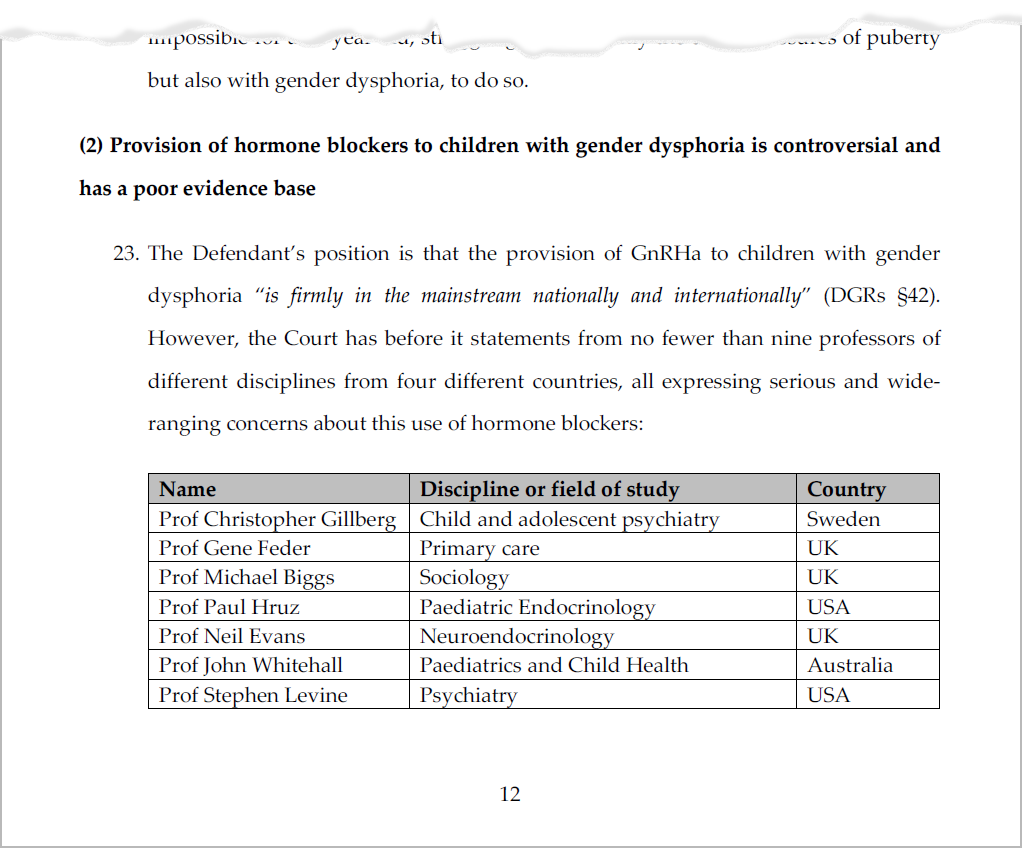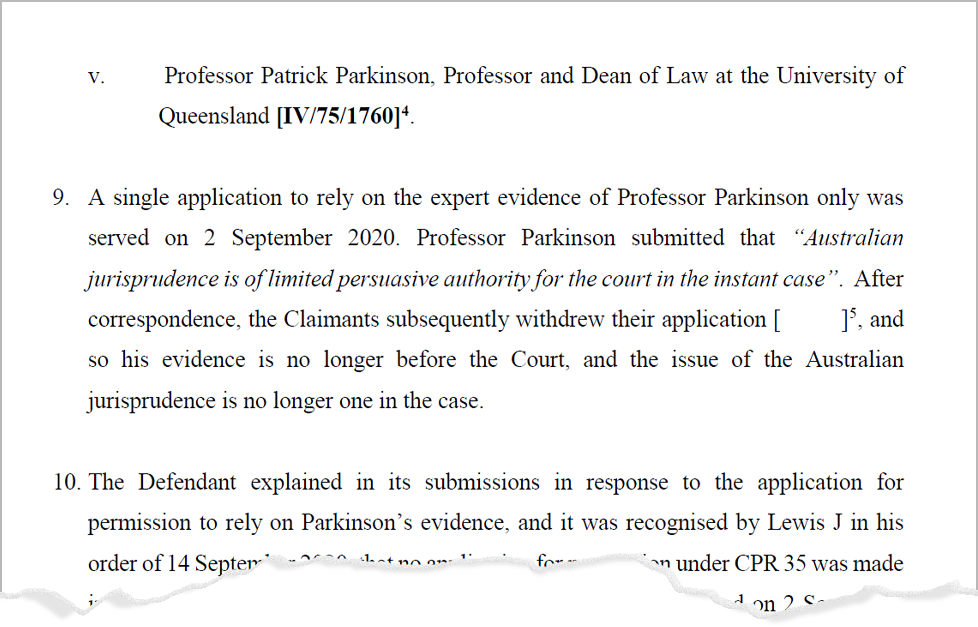
Two Aussie uni professors somehow wound up involved in a court case which now makes it harder for trans teens on the other side of the world to affirm their gender through medical treatment.
The Bell v Tavistock case made headlines when someone who took puberty blockers as a teenager later regretted it. Now, the British High Court has ruled that people under 16 can’t actually consent to this kind of medical treatment.
PEDESTRIAN.TV has obtained over 70 pages of skeleton arguments submitted to the UK High Court.
The documents show that the winning side enlisted as an expert witness John Whitehall, a Professor of Pediatrics at Western Sydney University who has admittedly never worked with gender dysphoric young people.
They also wanted to call on University of Queensland Professor Patrick Parkinson, a senior member of the University of Queensland’s law school who previously copped flak for comments which were widely considered to be transphobic.
President of the Australian Professional Association for Trans Health (AusPATH), Dr Fiona Bisshop, told P.TV that in her view these academics shouldn’t have been involved in the case in the first place.
“Neither of them are at all expert or even experienced in the care of trans and gender diverse youth, and both are well known for their very public views in this area,” she said.
“Their opinions should not be presented as expert testimony, and do not reflect the practice of professionals working in gender clinics in Australia – the real experts.”
Here’s why.
What was the Bell v Tavistock case about?
In 2013 Keira Bell visited the Tavistock clinic in London “questioning her gender”. At 16 she went on puberty blockers, at 17 she went on testosterone, and by 20 she had a double mastectomy. Now 23, she regrets it all and identifies as a woman again.
“I felt like a fraud and I began to feel more lost, isolated and confused than I did when I was pre-transition,” she told the court. She said the treatment left her with “no breasts, a deep voice, body hair, a beard” and possible infertility.
The crux of the case came down to whether or not puberty blockers are reversible, if patients were sufficiently warned about their effects, and if they’re a supposed gateway to physical surgery.
“This is about protecting vulnerable children”, Keira Bell, says the Tavistock gender identity clinic should have challenged her more over her decision to transition to male as a teenager. The 23-year-old was prescribed puberty blockers when she was 16 @Channel4News pic.twitter.com/1Ah0ext13e
— Minnie Stephenson (@MinnieStephC4) December 1, 2020
But one person’s own distress doesn’t necessarily reflect that of most trans teens. The myth that most trans teens later settle on the gender they were assigned at birth has been thoroughly debunked.
The court nevertheless ruled that young people under 16 with gender dysphoria can’t consent and will have to let a judge decide whether or not they can get medical treatment. Meanwhile, teenagers aged 16 and 17 will also face increased barriers in accessing puberty blockers and related treatments.
The decision has been slammed by trans rights advocates and health professions in the UK and overseas. Mermaids, the main org for trans and gender diverse young people in the UK, called the ruling “a dangerous betrayal of trans youth.”
What did Professor John Whitehall submit?
John Whitehall is a Professor of Paediatrics at Western Sydney University. He’s written extensively about trans young people, but in 2019 he admitted he’d never actually treated any children with gender dysphoria.
Whitehall was also the former deputy president of Fred Nile‘s Christian Democratic Party and has campaigned against the Safe Schools program.
According to the documents, Whitehall’s submission was used to argue that the the Tavistock clinic misled patients when it told them that puberty blockers were a reversible treatment because, as paraphrased in the skeleton argument, “from a child development perspective, no such assertion can be made with any confidence.”
However, AusPATH has hit back, stating that letting puberty follow its course is itself not physically reversible, which could result in “significant distress and loss of bodily autonomy.”
“Withholding puberty blockers is not a neutral option,” the AusPATH statement continued.

British newspaper The Sunday Times obtained court permission to publish an excerpt from Whitehall’s submission, which claimed that the info provided by the Tavistock clinic “does not appear to share with confused children and their parents and carers the statistical assurance that almost all confused children will revert to an identity congruent with chromosomes through puberty, that ‘puberty blockers’ and cross-sex hormones have structural effects on the brain, and the warning that the rate of suicide in adults is significantly higher after transgendering [sic].”
The idea that “almost all” gender dysphoric children “revert” to their assigned gender is based on discredited studies which are completely at odds with the latest data. As for the mental health claims, research has found that young people who go on puberty blockers are less likely to contemplate suicide than gender dysphoric young people who don’t.
Whitehall didn’t respond to repeated requests for comment, but when questioned about his participation in an ACL forum on gay conversion therapy in Victoria last year, he told P.TV: “In general, I believe an adult should be extended the human right of seeking and receiving help with unwanted mental preoccupations including, but not limited to, sexual orientation.”
It appears the sentiment of this loaded comment doesn’t apply to gender dysphoric young people.
What did Professor Patrick Parkinson submit?
During the court case Professor Patrick Parkinson was the academic dean and head of the University of Queensland’s law school, although he has since stepped down.
Parkinson has previously compared trans teens to people with eating disorders and likened the rise in teens wanting to affirm their gender to the coronavirus pandemic. These kinds of comments even sparked a revolt within the law faculty.
The documents show that during the pretrial, the claimants wanted to point to an old Australian case about a 13-year-old trans boy in Victoria where the judge ruled that teens couldn’t consent to puberty blockers. This was so they could argue that “the proposition being put in this case was not a novel one.”
However that Aussie court case has since been superseded and trans teens no longer need to ask a judge to go on puberty blockers in Australia. Tavistock pointed this out, basically turning the claimants’ argument against them.
That’s when the claimants called upon Parkinson’s family law expertise to defuse the situation. He stated: “Australian jurisprudence is of limited persuasive authority for the court in the instant case.”
Because of that, the whole line of argument ended up being avoided when the case actually went to trial.

“The essence of my advice was that the Australian courts have not had an opportunity to consider properly the medical and scientific evidence and to understand the debate in the medical and scientific literature,” Parkinson later told P.TV.
He said that the more recent Australian cases only heard from medical professionals who were supportive of young people accessing treatment, and thus, that “Bell v Tavistock is the first case to properly consider both sides of the argument.”
Parkinson is not a medical doctor.
Here’s why it matters
Thankfully, these kinds of debates are done and dusted in Australia, but it’s still strange to see two senior Aussie academics get involved in such a significant legal case which makes life harder for trans young people on the other side of the world.
In the UK, roughly half of trans people have attempted suicide, and a majority have considered it. Treatments such as puberty blockers are actually seen as a way to stop this.
“Whilst the decision is an appalling blow to trans youth in the UK, we in Australia should take heart in the knowledge that our guidelines have been found to be of a high standard and have withstood the scrutiny of the RACP,” Dr Bisshop said.
“This decision has however fueled more transphobic debate which is extremely damaging to our trans population. We are very hopeful that the Tavistock will be successful in their appeal against this decision.”



